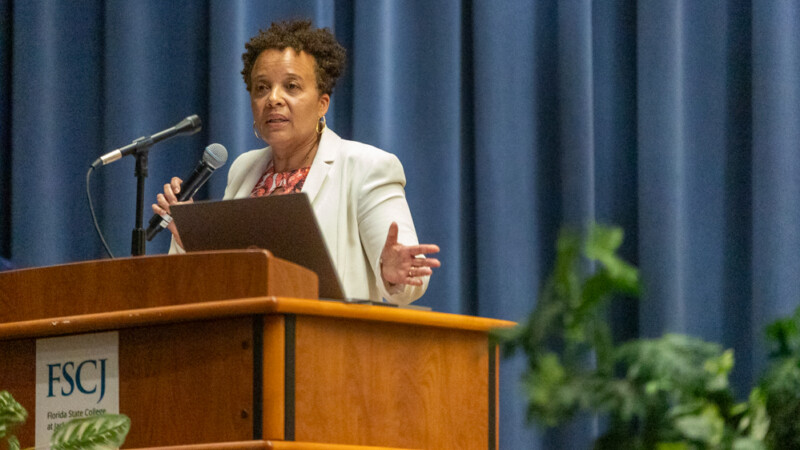It’s been a tough year for Josie. We’re not using her last name to protect her privacy. Ever since Surgeon General Dr. Joseph Ladapo started calling for a ban on gender-affirming medications for minors in the spring, the 15-year-old from St. Johns County has been terrified she’d lose access to the puberty blockers and hormones she takes to help her body align with her identity.
Medical boards appointed by the governor eventually voted in November to restrict doctors from prescribing these treatments, but children already receiving them can continue.
“I feel bittersweet about it,” Josie said. “Sweet because people like me who are already on the health care are not affected at the moment, but people who had a dream of having it are crushed.”
Several youth gender programs around the state have paused operations since this process began, even though the rules are not in effect yet. The public comment period for the Florida Board of Osteopathic Medicine’s proposal remains open until Dec. 28. That board, along with the Florida Board of Medicine, has other procedural steps to complete before the rules are finalized. Still, some families have already reported having appointments and procedures canceled.

‘Riddled with fear’
The University of Florida’s Youth Gender Program is still seeing patients. Staff are prioritizing kids who were already preparing to start hormone treatments, according to pediatric endocrinologist Dr. Kristin Dayton.
This kind of care comes after lengthy counseling, conversations with parents and physical health assessments — all in line with standards set by the World Professional Association of Transgender Health and Endocrine Society, Dayton said.
Kids also must have started puberty, which hasn’t happened yet for the 11-year-old daughter of a Florida woman named Elizabeth. She also asked us not to use her last name.
“There is not a day that passes that our family is not riddled with fear of what is going to happen to our healthy, thriving child if she is forced to go through a puberty that does not align to who she is,” Elizabeth says.
Elizabeth says since her daughter was a toddler, she has consistently been diagnosed with gender dysphoria, which is the distress a person feels when their gender doesn’t match their identity. Her parents supported her transition. At that young age it meant changing things like pronouns and clothing.
Elizabeth says most people don’t know her daughter was assigned male at birth. She says her daughter should be able to tell people when she’s ready. But this ban could disrupt her care. Her family is determined to prevent that from happening.
“We would likely have to attempt to seek care out of state, which would be an enormous burden, money that we simply wouldn’t have,” Elizabeth said.
Two standards of care?
There’s a chance Elizabeth’s daughter could access hormone treatments in Florida down the line. The Board of Osteopathic Medicine, which regulates doctors of osteopathic medicine, or DOs, included an exception in its rule. Doctors could prescribe new patients hormones for gender dysphoria if they’re part of a clinical trial at a medical school.
The Board of Medicine, which regulates medical doctors, or MDs, was planning to pass the same carve-out in its rule. But at the last joint meeting in November, some members, including the doctor who proposed the exception, motioned to eliminate it.
Voicing their concerns about gender-affirming treatments for minors, they referred to studies that claimed a large number of kids who went on hormones stopped transitioning later in life. Researchers have gone on to say the state misrepresented that data. More recent studies find the vast majority of kids who receive gender-affirming care stick with it.

Board Chair David Diamond said he shared some of his colleagues’ concerns but urged them to move forward with the research exemption.
“Let us study it,” he said of gender-affirming care. “Let us study it well. Let us use the advantages we have of having distributed high-quality medical schools throughout this state, and let us be the light to the world to determine the best care for these folks.”
But he was outvoted. If the boards remain at odds, legal experts say it would be unprecedented.
“What we are looking at now is truly bizarre because we have two different governing bodies who are going to have different standards of care for treatment of the same diagnosis, in the same population, in the same state,” said Simone Chriss, director of Transgender Rights Initiative at Southern Legal Counsel.
Concerns about what’s next
The boards could still make changes to these rules; both also bar doctors from performing gender-affirming surgeries on minors. Most health facilities already don’t allow these procedures for patients younger than 18. In rare cases, some doctors have performed surgeries, usually involving older teenagers getting breast tissue removed with parental consent.
Amendments could involve the Board of Medicine adding the research exemption back into its rule, or the Board of Osteopathic Medicine striking it from its. Gov. Ron DeSantis has appointed three new members to that board since the November vote, and their positions are on the proposed language are unclear.
Endocrinologist Dayton said she and colleagues at UF are exploring their options to get involved in a research study in the hopes the exception remains in the final rule.
Next up will be public hearings. Chriss, of Southern Legal Counsel, said she expects the boards will schedule the hearings in the new year, but they could do that sooner.
Some families say they have other questions that require clarity from the boards.
Lisa, who has requested we not use her last name, is raising a 13-year-old daughter in the greater Tampa Bay region. The teen was diagnosed with gender dysphoria at a young age and transitioned socially for years before starting puberty blockers to pause the development of traditionally masculine features like facial hair or a deepened voice.
Lisa is fairly confident that if the rules go into effect as written her daughter will be able to continue her puberty blocking medication without disruption. But she’s worried about the future.
“As she transitions from puberty blockers to [estrogen] hormones, I have no idea what the rule change will do for that transition,” Lisa said. “Is she grandfathered in? Is this all considered the same care or is it considered different care? We don’t know.”
The uncertainty is causing a lot of anxiety for Lisa and her daughter. The proposed rules, along with recent restrictions on discussing gender identity in schools, have them considering moving out of Florida.
“It’s difficult as a parent to know not only is my state failing to care for and protect my family, they’re actively seeking to harm them, and that’s difficult to align with wanting to stay,” Lisa said.
Josie, the teenager from St. Johns County, agrees this process has been traumatic, even if she gets to continue her health care. Her family was also contemplating moving if her treatment was disrupted. Now Josie says she feels like she needs to stay to support her trans friends who won’t have access to the same opportunities she did.
“It makes me feel pretty bad, but I have friends who depend on me here,” she said about continuing to live in Florida.
Families and advocates say they are uneasy about the future as they await the eventual implementation of these rules and whatever the next legislative session may bring. But they say they’re determined to keep fighting for transgender rights.
How to comment on the rule
Anyone interested in sharing feedback to the Florida Board of Osteopathic Medicine must contact Danielle Terrell, executive director, Board of Osteopathic Medicine/MQA, by Dec. 28.
Email: Danielle.Terrell@flhealth.gov
Address: 4052 Bald Cypress Way, Bin #C06, Tallahassee FL 32399-3256
The LGBTQ advocacy group Equality Florida also created an online portal where people can submit comments, which will be directed to the board. 9(MDAyNDY5ODMwMDEyMjg3NjMzMTE1ZjE2MA001))
Copyright 2022 WUSF Public Media – WUSF 89.7
9(MDEwNzczMDA2MDEzNTg3ODA1MTAzZjYxNg004))







